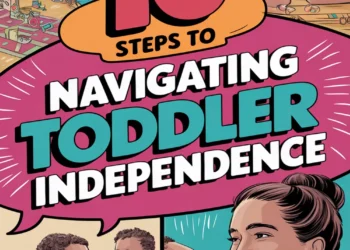To help your toddler overcome perfectionism gently and kindly, recognize their desire for mastery and approval. Encourage them to embrace mistakes as learning opportunities. Focus on celebrating effort rather than results, and provide realistic expectations that reduce overwhelm. Create a safe environment for exploration and promote a growth mindset by praising hard work. By validating their feelings and fostering resilience, you can guide them toward a healthier attitude. There are more strategies you can explore to support their journey.
Understanding Toddler Perfectionism
When you notice your toddler reaching for an impossible standard, it can be concerning and confusing. Understand that perfectionism in toddlers often stems from their innate desire to master skills and gain approval. This urge can manifest in a fear of failure or reluctance to try new things, leaving you worried about their emotional well-being. It’s important to recognize that this behavior is normal at this development stage, and your support is essential. By encouraging exploration and celebrating effort rather than outcomes, you help them embrace mistakes as learning opportunities. Create a safe space for them to express their feelings, letting them know it’s okay not to be perfect. With your guidance, they’ll learn that growth comes from trying, not just succeeding.
Recognizing the Signs of Perfectionism in Toddlers
It can be helpful to identify the specific signs of perfectionism in toddlers as you support their development. Recognizing these traits early can make a big difference in guiding them with care. Here are some signs to look for:
| Behavior | Example | Emotional Response |
|---|---|---|
| Excessive Self-Criticism | Often says, “I’m not good at this!” even for simple tasks | Frustration or sadness |
| Avoidance of Challenges | Refuses to try new activities for fear of not being perfect | Anxiety or withdrawal |
| Overemphasis on Results | Fixates on getting everything right, even in play | Stress or disappointment |
| Comparison to Others | Frequently compares their abilities to those of their peers | Insecurity or jealousy |
Recommended Items
Discover our curated selection of products and tools to support your parenting journey—let’s explore together!
Products
Fostering a Growth Mindset
Fostering a growth mindset in toddlers can transform their approach to challenges and learning. You can encourage this mindset by showing them that mistakes are simply stepping stones to improvement. Instead of focusing solely on getting things right, highlight the process of trying, experimenting, and exploring. When your toddler faces a challenge, remind them it’s okay to struggle; that’s part of learning. Use phrases like, “It’s great that you’re trying!” to reinforce the idea that effort matters more than perfection. By modeling resilience and celebrating curiosity, you help them see that persistence leads to growth. Encourage open discussions about feelings when things don’t go as planned, fostering an environment where they feel safe to learn and grow without fear of failure.
Celebrating Effort Over Outcome
Encouraging a growth mindset naturally leads to celebrating effort over outcome. When you focus on the process, you help your toddler understand that trying hard is what truly matters. Here are some ways to celebrate their efforts:
- Praise their hard work instead of just the final result.
- Acknowledge their perseverance during challenging tasks, reminding them that struggle is part of growth.
- Highlight improvement, no matter how small, to reinforce their journey.
- Create an environment where it’s safe to take risks and learn from those experiences.
Gentle Steps to Ease Toddler Perfectionism
Modeling Healthy Attitudes Toward Mistakes
While steering through the ups and downs of toddlerhood, demonstrating a healthy attitude toward mistakes can profoundly influence your child’s perspective. When you embrace your own errors gracefully, you teach your child it’s okay to stumble. Share your experiences openly—humble moments make for great lessons. Instead of feeling embarrassed or frustrated, show them how you analyze the situation, learn, and try again. Celebrate growth over perfection. Use phrases like, “I didn’t get it right this time, but I’ll keep trying!” This not only normalizes mistakes but also helps your little one understand that it’s a part of the learning process. By modeling this attitude, you’re nurturing resilience and confidence, making your child feel empowered to explore and express themselves without fear.
Creating a Safe Space for Exploration
How can you create an environment where your toddler feels free to explore without fear of judgment? It’s vital to establish a safe space that fosters confident exploration. Here are four ways you can do this:
- Encourage Curiosity: Show enthusiasm for their questions and discoveries, no matter how small.
- Limit Criticism: Focus on supportive feedback rather than pointing out mistakes.
- Provide Resources: Offer various materials and activities that allow them to experiment and learn.
- Model Exploration: Join them in their play, demonstrating how to explore without fear.
Encouraging Creative Play and Expression
Creative play is essential for your toddler’s development, allowing them to express themselves and explore their imagination. By encouraging activities like drawing, crafting, or imaginative storytelling, you help nurture their creativity and relieve the pressure of perfectionism. Let them experiment with different materials and ideas without fear of judgment. Celebrate their unique creations, and let their confidence blossom. Join in their play to strengthen your bond and show that exploration is more valuable than the final result. Set up open-ended activities, like building with blocks or finger painting, where there’s no right or wrong outcome. This freedom will enable your child to learn, grow, and express themselves, fostering a sense of joy and self-acceptance in their creative journey.
Setting Realistic Expectations
As you guide your toddler through their experiences, it’s crucial to set realistic expectations to help them navigate their journey without feeling overwhelmed. Making sure your little one understands what’s achievable can foster their confidence and reduce the pressure they place on themselves. Here are a few tips:
- Break tasks into small steps – Large tasks can be intimidating; simplify them for your toddler.
- Recognize their age and abilities – Acknowledge that skills develop at different rates.
- Encourage effort, not just results – Praise the process, reinforcing that trying is what’s important.
- Be patient and flexible – Keep in mind that mistakes are part of learning, so adapt as needed.
Communicating and Validating Feelings
While toddlers may struggle to articulate their emotions clearly, you can play an essential role in helping them feel understood and validated. Start by acknowledging their feelings, even when they express themselves in confusing ways. For instance, if they’re frustrated, say, “I see you’re feeling upset; that’s okay.” This simple acknowledgment reassures them that it’s normal to feel a range of emotions. Encourage them to express themselves by asking open-ended questions, such as, “What made you feel this way?” This promotes emotional vocabulary. Remember, it’s important to listen without judgment, showing that their feelings are valid by giving them your full attention. By doing this, you foster a safe space where they can explore and understand their emotions.













